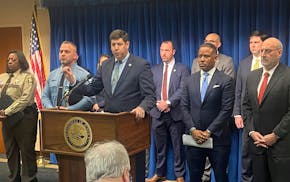Even as Mayor Jacob Frey urged City Hall to tighten the belt, Minneapolis residents will have to shoulder an increasing tax burden next year just to maintain existing services as property values continue to decline downtown and throughout commercial districts citywide.
In his 2025 budget address Wednesday, Frey proposed a $1.88 billion budget and an 8.1% tax levy increase in 2025, followed by a 9.8% levy increase in 2026 to pay for ongoing operations, continued investments in housing and economic recovery, and looming obligations to personnel and police reform. These include a 30% raise for Public Works employees over three years and a 21.7% raise for police, as well as the costs of complying with the new Minnesota Department of Human Rights settlement agreement and bracing for an anticipated U.S. Department of Justice consent decree, both stemming from the murder of George Floyd.
"My administration worked to find ways to do more with less, and I'm really proud to say that we did," Frey said. "Now, I'm not expecting us to celebrate this lift, because our residents have a new lift of their own in property taxes, but this budget provides a way through. We're doubling down on programs that work. We're ensuring our resources are used effectively, and we're making sure our communities feel the benefit."
The address was livestreamed via the city's YouTube page.
As the city spends the last of its COVID-19 relief funds, next year will be the first year in several without the federal buoy. Earlier this year, officials revealed that the city faced a projected deficit of $21.6 million in 2025. That projected shortfall forced Frey's administration to get creative to avoid making major cuts; the city is required to pass a balanced budget.
Budget staff looked to deflect the pain by making transfers to the General Fund from a fund for maintaining the downtown assets of the Convention Center, Target Center and Peavey Plaza, as well as borrowing more to pay for long-promised construction projects such as the $17 million South Minneapolis Community Safety Center to replace the burned-out Third Precinct police station. Still, the magnitude of the mayor's proposed levy increase of more than 8% hasn't been seen since the mid-2000s.
"The way people use downtown is changing, and so we must adapt to a new future," Frey said. "The way property taxes are collected is changing, and we must find new revenue streams that don't disproportionately impact low-the income residents, our neighbors. Costs in many areas have risen, and it's on us to change our practices, to find efficiencies and, yes, make data-driven and necessary decisions on when and what to cut. While change can be uncomfortable, we will find a way through."
The median household, valued at $329,000, should expect to pay an additional $207 for an estimated total of $2,098 in 2025.
Other expenditures in the mayor's proposed budget include affordable housing construction, $10 million to the Climate Legacy Initiative, downtown recovery through beautifying storefronts, activating Nicollet Mall and technical assistance for small-business owners, and a renewed allocation of $5 million for the Minneapolis Public Housing Authority, new last year.
Next in the annual budget process, the Board of Estimate and Taxation will hold a public hearing in September to get residents' input and set the maximum property tax increase. The City Council will then hold additional public hearings and propose amendments to the mayor's recommended budget. By late November residents will get estimated tax statements from Hennepin County, which will include their city, county and school district taxes for 2025, as well as the date of the Truth in Taxation hearing for the city portion of property taxes. The City Council will adopt the final budget by mid-December and submit it to the mayor for approval.
Earlier this week, St. Paul Mayor Melvin Carter proposed a $854.9 million budget for the capital city in 2025, including a 7.9% tax levy increase.
Lawmakers strike a deal on state budget, Gov. Tim Walz calls Monday special session
University of Minnesota proposes 7% budget cuts and largest tuition hike in more than a decade

Five members of Minneapolis Highs street gang found guilty of racketeering conspiracy

Search for Twin Cities teen missing for nearly month now focusing on landfill

